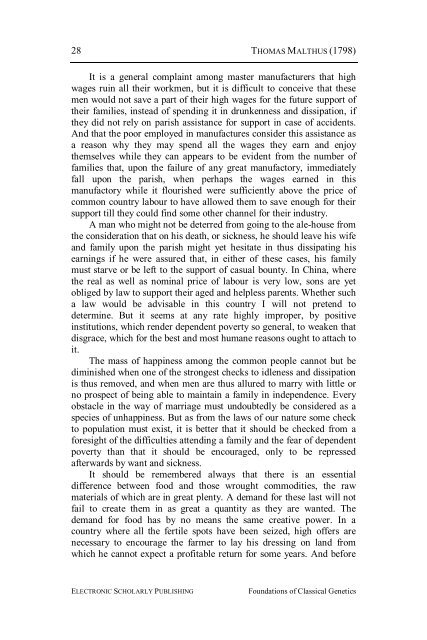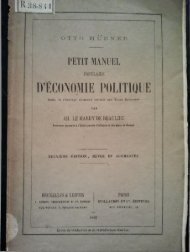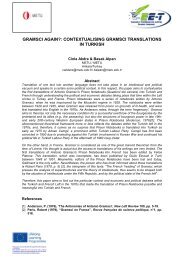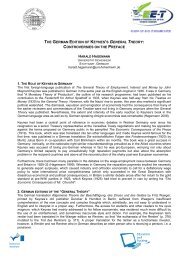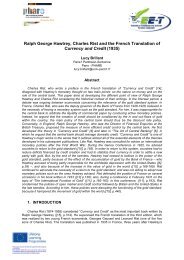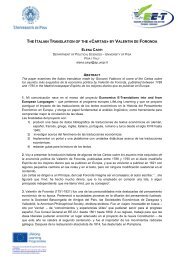Malthus, Thomas, Robert, An Essay on the Principle of Population ...
Malthus, Thomas, Robert, An Essay on the Principle of Population ...
Malthus, Thomas, Robert, An Essay on the Principle of Population ...
You also want an ePaper? Increase the reach of your titles
YUMPU automatically turns print PDFs into web optimized ePapers that Google loves.
28 THOMAS MALTHUS (1798)<br />
It is a general complaint am<strong>on</strong>g master manufacturers that high<br />
wages ruin all <strong>the</strong>ir workmen, but it is difficult to c<strong>on</strong>ceive that <strong>the</strong>se<br />
men would not save a part <strong>of</strong> <strong>the</strong>ir high wages for <strong>the</strong> future support <strong>of</strong><br />
<strong>the</strong>ir families, instead <strong>of</strong> spending it in drunkenness and dissipati<strong>on</strong>, if<br />
<strong>the</strong>y did not rely <strong>on</strong> parish assistance for support in case <strong>of</strong> accidents.<br />
<str<strong>on</strong>g>An</str<strong>on</strong>g>d that <strong>the</strong> poor employed in manufactures c<strong>on</strong>sider this assistance as<br />
a reas<strong>on</strong> why <strong>the</strong>y may spend all <strong>the</strong> wages <strong>the</strong>y earn and enjoy<br />
<strong>the</strong>mselves while <strong>the</strong>y can appears to be evident from <strong>the</strong> number <strong>of</strong><br />
families that, up<strong>on</strong> <strong>the</strong> failure <strong>of</strong> any great manufactory, immediately<br />
fall up<strong>on</strong> <strong>the</strong> parish, when perhaps <strong>the</strong> wages earned in this<br />
manufactory while it flourished were sufficiently above <strong>the</strong> price <strong>of</strong><br />
comm<strong>on</strong> country labour to have allowed <strong>the</strong>m to save enough for <strong>the</strong>ir<br />
support till <strong>the</strong>y could find some o<strong>the</strong>r channel for <strong>the</strong>ir industry.<br />
A man who might not be deterred from going to <strong>the</strong> ale-house from<br />
<strong>the</strong> c<strong>on</strong>siderati<strong>on</strong> that <strong>on</strong> his death, or sickness, he should leave his wife<br />
and family up<strong>on</strong> <strong>the</strong> parish might yet hesitate in thus dissipating his<br />
earnings if he were assured that, in ei<strong>the</strong>r <strong>of</strong> <strong>the</strong>se cases, his family<br />
must starve or be left to <strong>the</strong> support <strong>of</strong> casual bounty. In China, where<br />
<strong>the</strong> real as well as nominal price <strong>of</strong> labour is very low, s<strong>on</strong>s are yet<br />
obliged by law to support <strong>the</strong>ir aged and helpless parents. Whe<strong>the</strong>r such<br />
a law would be advisable in this country I will not pretend to<br />
determine. But it seems at any rate highly improper, by positive<br />
instituti<strong>on</strong>s, which render dependent poverty so general, to weaken that<br />
disgrace, which for <strong>the</strong> best and most humane reas<strong>on</strong>s ought to attach to<br />
it.<br />
The mass <strong>of</strong> happiness am<strong>on</strong>g <strong>the</strong> comm<strong>on</strong> people cannot but be<br />
diminished when <strong>on</strong>e <strong>of</strong> <strong>the</strong> str<strong>on</strong>gest checks to idleness and dissipati<strong>on</strong><br />
is thus removed, and when men are thus allured to marry with little or<br />
no prospect <strong>of</strong> being able to maintain a family in independence. Every<br />
obstacle in <strong>the</strong> way <strong>of</strong> marriage must undoubtedly be c<strong>on</strong>sidered as a<br />
species <strong>of</strong> unhappiness. But as from <strong>the</strong> laws <strong>of</strong> our nature some check<br />
to populati<strong>on</strong> must exist, it is better that it should be checked from a<br />
foresight <strong>of</strong> <strong>the</strong> difficulties attending a family and <strong>the</strong> fear <strong>of</strong> dependent<br />
poverty than that it should be encouraged, <strong>on</strong>ly to be repressed<br />
afterwards by want and sickness.<br />
It should be remembered always that <strong>the</strong>re is an essential<br />
difference between food and those wrought commodities, <strong>the</strong> raw<br />
materials <strong>of</strong> which are in great plenty. A demand for <strong>the</strong>se last will not<br />
fail to create <strong>the</strong>m in as great a quantity as <strong>the</strong>y are wanted. The<br />
demand for food has by no means <strong>the</strong> same creative power. In a<br />
country where all <strong>the</strong> fertile spots have been seized, high <strong>of</strong>fers are<br />
necessary to encourage <strong>the</strong> farmer to lay his dressing <strong>on</strong> land from<br />
which he cannot expect a pr<strong>of</strong>itable return for some years. <str<strong>on</strong>g>An</str<strong>on</strong>g>d before<br />
ELECTRONIC SCHOLARLY PUBLISHING<br />
Foundati<strong>on</strong>s <strong>of</strong> Classical Genetics


